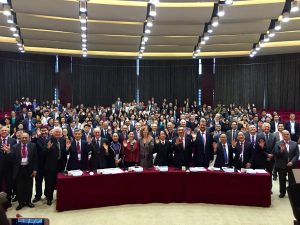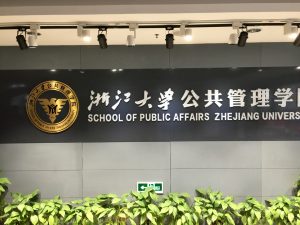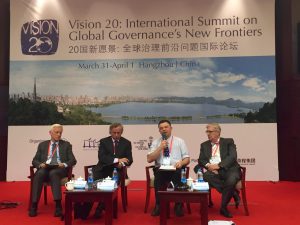
So it is evident there is much anger out in ‘election land’ and among the many electorates these days. The distemper is widespread. The ‘oddest’ of campaigns of course is the Presidential race – just 98 days away – in the United States. A campaign driven in part by the Republican nominee who has abused his opponents and his putative friends – all in the name of ‘no more political correctness’. We are reminded constantly that rising inequality and plodding economic growth across the established powers and increasingly among the rising powers has led to growing frustration and anger from those in the 99 percent. Whether you are looking at global GDP, global trade, or global investment, all these measures of possible global prosperity look anemic. At a minimum these measures signal that the global economy has in fact not really recovered from the Great Recession.
Gideon Rachman of the FT suggested very recently that there is a strong link between those supporting Donald Trump in the US and those who voted in favor of leaving the EU in the UK referendum. As Rachman concludes in assessing these Brexit voters:”The second [parallel] is the way in which the Trump and Brexit campaigns have become vehicles for protest votes about economic insecurity. The third is the chasm between elite opinion and that of the white working class.” While it is of course much harder to identify frustration and alienation from governments in authoritarian societies, it is not hard to believe that there is much anger lying ‘just below the surface’ in states with authoritarian regimes and high degrees of inequality such as in China and Russia and in more democratic developing ones such as Brazil and South Africa.
The point here is that there is growing resentment against the political elites that govern the major economies, and beyond. So, if the political task has become ever more difficult in leading nations in the global economy of high and growing interdependence that fails to return robust economic growth, how much harder is it for leadership to break through at the international level to tamp down anger and frustration among their own publics. Of course there is no immediate government to focus the growing ire from these citizens. As international relations specialists have long pointed out – the global order is ‘governance without government’.
Where leaders, though, appear to have the greatest leadership presence is in the ‘Informals’ – those leader-driven institutions where collective leadership comes together periodically to press forward on policies that address, hopefully, the difficult global economic challenges facing the global order. And of those the most evident institutional setting is the G20 Leaders Summit. This Leaders Summit arose to meet the challenges presented by the 2008 global financial crisis. And it is generally accepted that the G20 Leaders acted with enough coordination that the global economy avoided a breakdown that could have easily rivaled the Great Depression. It is also commonly accepted that the G20 Leaders Summit has failed subsequently to provide much successful collective leadership since that time.
Even the great ‘heroes’ of the G20 have come to accept that the G20 is failing to act collectively to meet the growing global economic challenges. Take Paul Martin, former Prime Minister of Canada and one of the founders of the G20 Finance Ministers in the late 90s and also a strong advocate for what became the G20 Leaders Summit . As he recently spoke and wrote in the new journal Global Summitry: Politics, Economics and Law in International Governance, and by video, to a large G20 gathering in Hangzhou China (more on that in a moment) he expressed the Leaders’ difficulties:
The upcoming Hangzhou Summit will be one of the most important in G20 history. One because it is in China; and second while the G20 has had its successes, if its objective is to make globalization work as I have always believed it must be, to be frank, of late it has fallen short of the mark.
And it is evident that part of the difficulty for the G20 is that there is little or no focus on the publics of these countries. The connections just aren’t there. The policy pronouncements from the Leaders Summits are barely understood by the experts, let alone the officials and experts from the G19 countries and the host of formal international institutions that have come to generate the communiques. Now in a follow up blog I hope to examine the content of current G20 thinking. But let me for the moment focus on the enormous gap between leaders and global publics.

A number of us, most prominently my good colleague Yves Tiberghien, the director of the Institute of Asian Research at the University of British Columbia huddled together and formulated a plan. And out of this plan grew a very large gathering at Zhejiang University (notice the large gathering) in Hangzhou China. With support from the University, and the Zhejiang provincial government and others including a number of private sector actors from China we brought together a stellar gathering of academics, researchers and students, think tankers from North America and China and former officials from many of the key formal institutions such as the WTO, the World Bank and the IMF. As well a number of former ‘sherpas’ from the G20 also joined the gathering.
 The Conference in late March was a blur of panel presentations and discussions. There were formal discussions and many informal gatherings throughout the time of the conference. And following the formal conference, titled the Vision 20: International Summit on Global Governance’s New Frontiers, a Working Group was formed to prepare a Blue Report (what we in the West would describe as a White Paper). The object of the Blue Report was to highlight the thinking of the Vision 20 Conference and pass on to government officials in China, especially those with responsibilities for the G20 meeting, our collective views. That was all done and officials subsequently gave approval for the Blue Report to become public. This Blue Report was made public on July 21st.
The Conference in late March was a blur of panel presentations and discussions. There were formal discussions and many informal gatherings throughout the time of the conference. And following the formal conference, titled the Vision 20: International Summit on Global Governance’s New Frontiers, a Working Group was formed to prepare a Blue Report (what we in the West would describe as a White Paper). The object of the Blue Report was to highlight the thinking of the Vision 20 Conference and pass on to government officials in China, especially those with responsibilities for the G20 meeting, our collective views. That was all done and officials subsequently gave approval for the Blue Report to become public. This Blue Report was made public on July 21st.
As the title identifies (Give the World Hope: G20 Leadership for People-Centred Inclusive and Sustainable Growth), a principal concern of all who attended and participated in the V20, and especially those who stayed back (see the list at the bottom of the Working Group), to work on the Blue Report all acting in their personal capacities, the strongest message was the G20 Leaders had to do a far better job of communicating with their national publics. What could possibly accomplished without their publics. What was needed was a clear and accessible communication that could engage publics in the G19 countries and the EU and beyond:
The financial crisis of 2008 and its consequences are still with us. For most people in the world, their lives, economic security, incomes, and livelihoods have been disrupted, perhaps permanently. There is an urgent need for global leadership. However, for too many people, global governance and the G20 Leaders Summits are seen as too technical and controlled by bureaucrats and officials. The Working Group (WG) believes it necessary to reinforce the role of the G20 as the pivotal vehicle for ensuring the stability, and welfare-enhancing capability of global interdependence. Giving credence to this approach is the ability of the G20 to enhance the integration of emerging powers into the global governance architecture.
In 2016, under China’s presidency, the G20 can send credible signals that will reassure global decision-‐makers and global publics alike. The G20, hosted by China, can initiate a number of meaningful reforms for a people-centered global governance architecture. The WG also believes the G20 can improve the operation of the global economy. China can offer leadership in this setting: G20 leaders can enhance the connections with their publics through a ‘people-centered’ strategy; investment for macro-economic growth policies in the short run; and equality-enhancing and sustainability initiatives for all in the long run. …
The WG believes that Leaders at G20 Summits can strengthen their connection with their publics by devoting more attention to the content and the modes of communications from the summit platform. Several innovations could be made including:
- A new style of G20 Communiqué: A parsimonious brief announcement, written for the public and with a public presentation of the declaration by the G20
-
A statement targeting the global situation in clear and accessible language. Key ideas could be summarized and Leaders could speak in more direct ways to their publics. The WG believes that G20 leaders understand that globalization requires fair and updated rules that can elicit trust, a sense of fairness, and certainty. We believe G20 leaders can communicate in ways that will increase the stability of the global economy, and improve distribution of the benefits of globalization to the majority of the world’s
There it is – simple but extremely difficult at the same time. Leaders are at the apex of the ‘global governing Iceberg’, an enormous governance mechanism built with officials, ministers, regulators and working groups all offering technical and incremental policy. Valuable possibly; but largely divorced from the many publics these Leaders are responsible to for economic prosperity.
And here is a ‘tip of the hat’ to all those in the Working Group (WG) that devoted time and attention in their personal capacities to craft the Blue Report:
Alan ALEXANDROFF, Director, Global Summitry Project, Munk School of Global Affairs, University of Toronto
Amar BHATTACHARYA, Senior Fellow, Global Economy and Development Program, Brookings Institution; former Director of the Group of 24; former Senior Advisor and Head, the International Policy and Partnership Group, World Bank
Colin BRADFORD, nonresident Senior Fellow, Global Economy and Development, Brookings Institution; former Chief Economist, U.S. Agency for International Development
Benjamin Jerry COHEN, Professor, International Political Economy, University of California, Santa Barbara
Andrew COOPER, Professor, the Balsillie School of International Affairs and the Department of Political Science, University of Waterloo; Associate Senior Fellow, Centre for Global Cooperation Research
Miles KAHLER, Senior Fellow for Global Governance, Council on Foreign Relations; Distinguished Professor, American University
Homi KHARAS, Senior Fellow and Deputy Director, Global Economy and Development Program, Brookings Institution; former Chief Economist, East Asia and Pacific Region, World Bank Group
GUO Sujian, Professor, School of Public Affairs; Director, Environmental and Energy Policy Center, Zhejiang University
LIM Wonhyuk, Director of Policy Research, Center for International Development, Korean Development Institute
Jona Widhagdo PUTRI, Lecturer, International Relations, Faculty of Social and Political Sciences, Universitas Indonesia
Yves TIBERGHIEN, Director, Institute of Asian Research; Co-‐Director, the Master of Public Policy and Global Affairs; Executive Director, China Council; Associate Professor of Political Science, the University of British Columbia
WANG Yong, Professor, the School of International Studies, Peking University; Director, the Center for International Political Economy Research
XUE Lan, Dean, School of Public Policy and Management, Tsinghua University
YU Jianxing, Professor and Dean, School of Public Affairs, Zhejiang University
ZHANG Haibing, Director, Institute for World Economy Studies, Shanghai Institute for International Studies
ZHANG Yanbing, Associate Professor, School of Public Policy and Management, Tsinghua University; Deputy Director, Institute of International Strategies and Development, Tsinghua University
Image Credit: Yves Tiberghien

